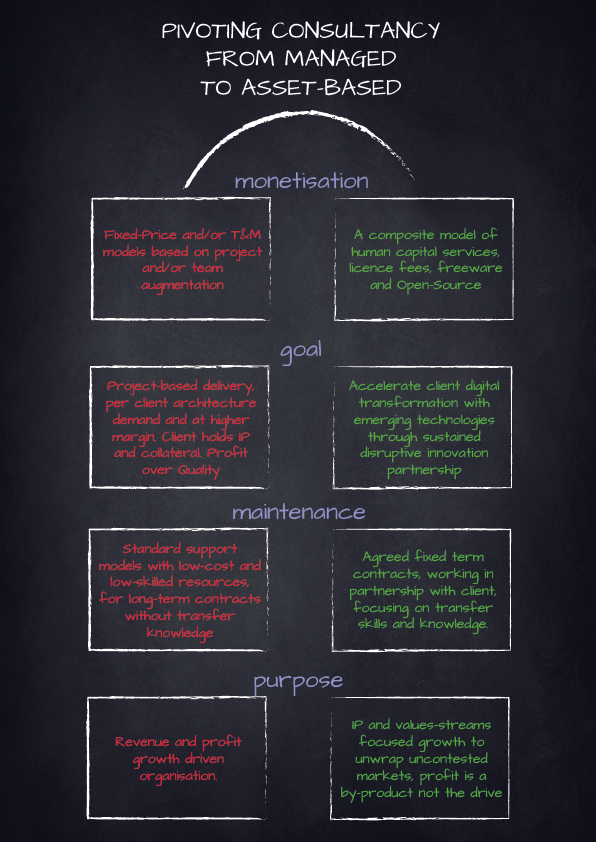Unlocking Potential Through the Transition from Management Consulting to Asset-Based Consulting (ABC)

“There is surely nothing quite so useless as doing with great efficiency what should not be done at all.”
Peter Drucker
As a customer of Management Technological Consulting and the founder of a similar firm, I have observed the disruption of consultancy business models. Over the past eight years, I have gained insights into the market that have led me to a new understanding on this subject.
What is a Management Technological Consulting?
Management Technological Consulting is a professional services firm that specialises in strategic assistance, technological solutions, and operational enhancements to maximise client performance and achieve business objectives. It helps clients navigate the digital landscape, improve decision-making, and drive growth by integrating managerial, technological, and domain expertise.
Management Technological Consulting works closely with clients to identify new growth opportunities, enhance current processes, and implement innovative technologies. This enables clients to develop a competitive advantage and achieve long-term success.
My reflection on the market is quite different from the above.
Management Technological Consulting is characterised by a client-driven approach. Clients accept as many consultants as their budget can accommodate, seeking the lowest reasonable price. This creates a transactional dynamic where both parties aim to maximise profits, prioritising shareholder interests over the quality of the relationship.
Given the client is funding the engagement, the nature of the relationship is harsh and unambiguous. The client's demands take precedence, and consultants must comply regardless of accuracy, as maintaining the client relationship is paramount.
Management Technological Consulting often assigns a managerial expert with limited technical knowledge as the client relationship manager. This individual oversees the delivery team, imposing their authority on technical decisions to maximise annual compensation, margins and profits.
The delivery team members are viewed as expendable and replaceable. They are frequently junior graduates lacking experience and technological expertise, but willing to learn on the job - all to the company's financial benefit.
The current state of Management Technological Consulting has the feel of a low-budget film with a poor screenplay and acting. However, sincere, values-driven firms with deep expertise are working towards a paradigm shift to asset-based consultancy.
This strategic shift aims to differentiate these competent consultancies from the mainstream model, while diversifying revenue streams beyond outsourcing and lower-cost offshore operations.
What is an Asset-Based Consulting (ABC)?
Asset-Based Consulting (ABC) is a professional services firm focused on knowledge assets. Rather than a traditional project-based model relying on human capital deployment, ABC delivers ongoing client engagements by building intellectual property.
ABC generates and manages value-added services and innovative solutions using its core competencies, existing resources, and accumulated expertise. This enables the firm to move beyond a project-based delivery approach.
Rather than just addressing issues and delivering outcomes, ABC's focus is on reusable assets - tools, methods, frameworks, ways of working or solutions inspired by past client engagements and research.
The emphasis is not solely on meeting the client's immediate needs, but also on developing intellectual property (IP) that can be leveraged across various business models. This includes using the IP as accelerators for future client work, business development collateral, knowledge transfer, advisory services, licensing, or open-source solutions.
“The overarching aim is to steadfastly deliver client value while growing the organisation's intellectual property. (IP).“
Assets can be physical, such as technology, infrastructure or solutions, as well as intangible, like expertise, relationships, methodologies and processes.
The emphasis is on long-term, knowledge-driven organisational success. ABC helps clients grow based on their needs, not just perceived wants, in exchange for domain knowledge.
Rather than a standard "time and materials" pricing model, ABC takes a more comprehensive approach, going beyond mere augmentation to implement sustainable, reliable income structures.
A typical Asset-Based Consulting will include the following features:
- ABC leverages a company's core strengths and skills to drive ongoing development and partnership-based success.
- It pursues SAS (Sustainable, Amiable, and Sufficient) growth fueled by values and purpose, where profit is a by-product, not the main driver.
- ABC identifies underutilised organisational resources to enable continuous research, strengthen existing assets, and spawn new ones.
- The flattened, decentralised structure recognises contributions from all parts, unlocking possibilities through collaboration.
- ABC operates as a living organisation, driven by an iterative business OS of exploration and experimentation. It values people, complexity-consciousness, innovation, creativity and entrepreneurship.
- Continuous hypothesis testing and learning loops generate differentiating leaps that create value for both the organisation and clients.
- ABC delivers tailored solutions by combining unconventional consulting approaches with internal knowledge to produce and implement high-quality solutions quickly.
- An intense curiosity drives ABC to challenge established wisdom and norms, prioritising discovery and progress.
- Crucially, ABC also applies first principles thinking to uncover fundamental truths and reimagine solutions from the ground up.
The following bullet points is a list of common advantages of employing an Asset-Based Consulting approach:
- ABC increases resource utilisation and knowledge through practical experience, allowing inexperienced staff to integrate into critical areas with greater competence.
- It focuses on leveraging an organisation's assets, resources and competencies to maximise value and minimise risks, without sacrificing quality or innovation.
- ABC applies design thinking, product-driven and lean startup approaches to improve agility, flexibility, customisation and innovation.
- The multidisciplinary, knowledge-based organisation develops tools, techniques and methodologies that enable intensified innovation. This helps businesses respond more effectively to market trends and disruption.
- Decentralised, self-managed and accountable systems boost productivity and foster organisational growth through asset capitalisation.
- ABC ensures solutions align with the client's current and future values and goals, fostering cooperation and strategic partnership.
- Shorter integration project cycles reduce time spent on identification, analysis and management, facilitating quicker integration and outcomes.
- An enhanced entrepreneurial culture accelerates plans, initiatives and results.
- Experimentation with technology and disruptive innovation aids in identifying new opportunities and developing novel solutions to address real problems quickly.
- ABC leverages defects as learning experiences, tackling disruptive innovation head-on to help organisations maximise technology investments.
- The solution-focused approach emphasises creating value streams rather than just resolving problems.
- It increases an organisation's capacity to navigate complexity and systems by embracing challenges through simplification and breakdown.
- ABC invests in the growth and development of its staff's talents, recognising the need to develop human capital.
The power of Assets!
In future articles, I will explore how learning from nature's phenomena, such as Murmuration and Mycelia, inspires my approach to systems and solutions architecture.
For this paper, I will include some fundamental patterns to ideate successful Assets as part of the Asset-Based Consulting model.
Asset-Based Consulting must design resilient Assets - a by-product of numerous experimental concepts tested across diverse client use cases. These proven, live operational solutions are committed to minimising downtime, upholding availability, and reducing user impact.The focus is on preserving service continuity, allowing users to access critical data and functionality without interruption or errors. This is achieved by keeping systems functioning despite faults or breakdowns.Augmented AI with self-healing features increases fault tolerance, helping systems tolerate rather than eliminate errors. This prevents catastrophic failures, while enabling faster recovery through higher automation and autonomic adaptation, reducing operational complexity, cost and manual intervention.
Assets are inherently multi-purpose solutions that simplify workflows and consume fewer resources, boosting productivity. This is achieved through decomposable applications built on a microservices architecture.Assets reduce technical debt, software licensing, maintenance and training costs by consolidating functionalities in a single solution focused on open-source technologies and unified interfaces.
Assets must be designed as decentralised and distributed by default. This dispersed, mesh-like model protects against sophisticated threats, allowing enterprises to quickly adopt and administer security policies, reducing incidents and response times.The decentralised approach provides multiple layers of protection, redundancy and fallback measures, distributing governance across the enterprise. Distributed data offers faster, more efficient retrieval and processing, optimising network resources and reducing bandwidth/processing demands.This architecture supports large datasets without impacting performance, can better withstand node failures than replicated data, and improves localised data storage while preserving global connectivity and proximity. Ultimately, it enhances the user experience by placing computing resources closer to users.
Assets are decoupled yet collaborative - a system of artefacts functioning as independent units with a collective purpose. They constantly react to change, forming new patterns.The distributed service mesh architecture provides improved scalability, agility, security, observability, reliability, simplified network management, fault tolerance, and cost-effectiveness.Large applications can be broken down into smaller, independently scalable microservices. This enhances security by enabling encrypted communication and direct authentication/authorisation between services. It also improves observability and monitoring, simplifying diagnostics and boosting performance.Crucially, the resilient microservices design allows the system to continue functioning even if individual components fail or become unresponsive.
At the core of the Asset-Based Consulting approach is a commitment to First Principles thinking. By stripping away assumptions and preconceptions, this methodology simplifies complexity and unlocks innovative solutions. Rather than building upon existing frameworks, ABC challenges fundamental truths to reimagine problems from the ground up. This allows the development of Assets that are not constrained by conventional wisdom or legacy approaches. Through First Principles analysis, ABC is able to identify the essential elements required to address a client's needs, designing streamlined, efficient solutions that maximise value. This clarity of purpose, combined with a willingness to question established norms, is a key driver of ABC's ability to deliver transformative results for organisations navigating complex challenges.
The commercial benefits!
There are many commercial advantages to adopting an Asset-Based approach.
Retaining and recruiting highly skilled people is particularly challenging. The best human capital tends to become bored with repetitive work or everyday tasks that offer little learning opportunity.
Technical consultancies face constant competition from product companies offering higher salaries and other perks. However, by investing in knowledge assets as the core business, ABC significantly increases the probability of maintaining exceptional technical minds.
ABC's focus on knowledge assets provides long-term business cash flow with improved projected revenue and resource distribution, avoiding the downturns and uncertainties of project-based work.
It increases the overall intellectual property, as the consultancy gains domain-specific knowledge from clients to further improve and create new Assets.
This approach boosts the probability of generating new leads and maintaining long-term client relationships. It gives the best minds opportunities to showcase their skills, allowing clients to appreciate top experts in their fields.
Significantly, it improves company branding and the ability to attract talent and new clients. Strong, positive branding is fundamental for maintaining a higher rate card.
Ultimately, ABC institutes a culture of innovation and value creation as a market leader. This orientation is focused on achieving a leap in value origination and discovering new, uncontested market space.

Epilogue
"The ecstasy of deciphering the unsolved."
This simple statement encapsulates the essence of Asset-Based Consulting's approach. It speaks to the thrill of uncovering fundamental truths, of challenging convention, and of reimagining problems from first principles.
For an ABC company, this intellectual curiosity and drive to solve the complex is a source of deep satisfaction. By stripping away assumptions and embracing a beginner's mindset, the teams experience the joy of discovery - unlocking innovative solutions that transform the way organisations operate.
This passion for deciphering the unsolved permeates the culture of ABC. It fuels the individual's relentless pursuit of knowledge, their willingness to experiment, and their commitment to pushing the boundaries of what is possible.
In the end, it is this ecstasy of problem-solving that allows ABC to deliver Assets of unparalleled value - not just for their clients, but for the overall company. It is the driving force behind the collective mission to simplify complexity and create new, uncontested market space.
References
- The Creative Consulting Company, by HBR
- Consulting on the Cusp of Disruption, by HBR
- Asset-Based Consulting Will Gradually Change The Consulting Revenue Model, By Forrester
- Asset-Based Consulting. Why Leading Consulting Firms Are Adopting It. By 9 Lenses


